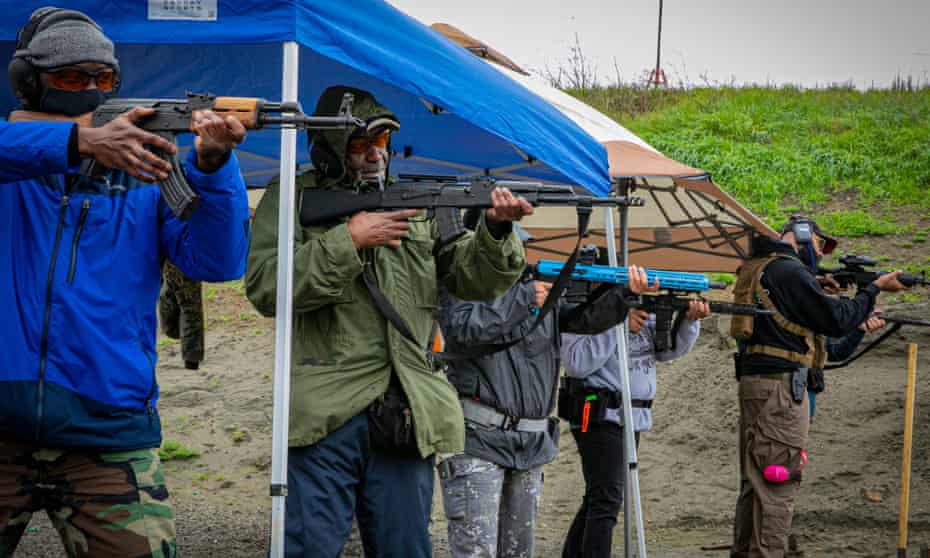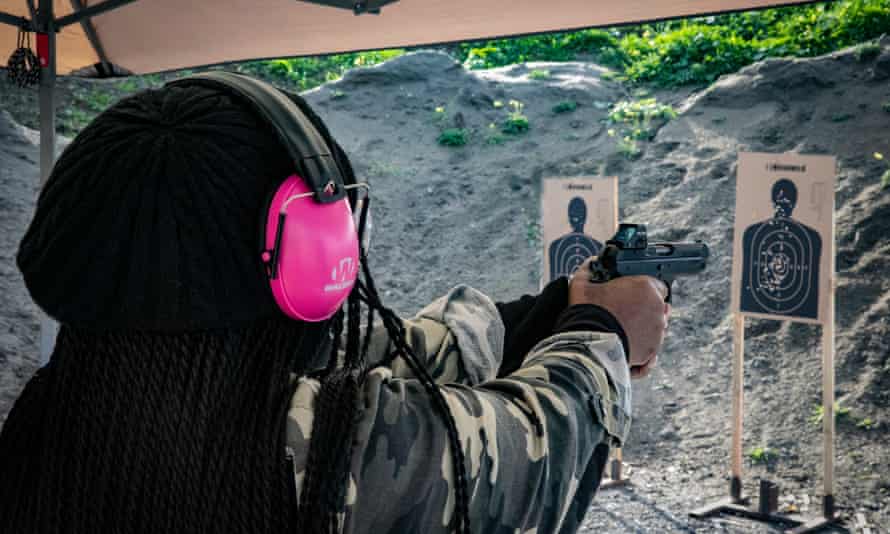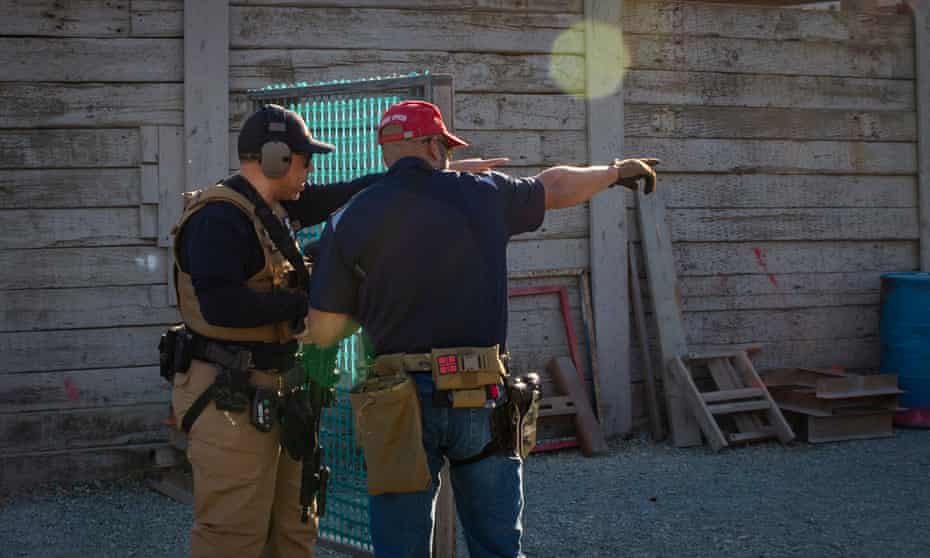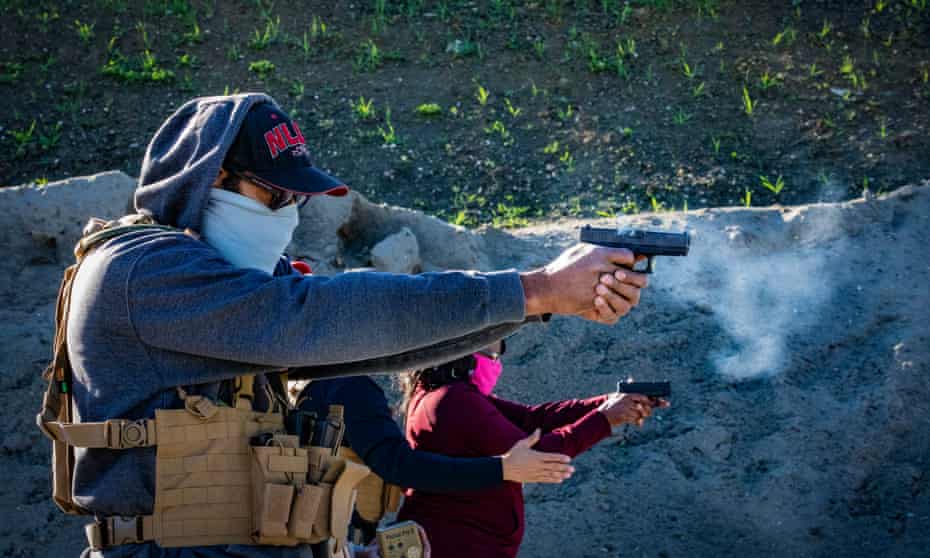Black Americans flock to gun stores and clubs: 'I needed to protect myself'

Americans bought a record number of firearms last year. Gun ownership among Black Americans is up 58.2%
Last modified on Mon 5 Apr 2021 06.01 EDT
Janice Matthews* always knew she would be a gun owner someday. She was raised in Alabama where her family members rarely left their home unarmed. Still, after more than three decades in California she wasn’t in a rush to start shopping around at gun stores. Then the pandemic hit.
Matthews started hearing rumors of food shortages and noticed store shelves emptied by shoppers panic-buying everything from bullets to toilet paper. After her daughter moved out of their home, she was left with an empty nest and a lot of anxiety.
“I was thinking of what they predicted in the Bible and I thought I would have to protect the little bit that I had,” Matthews, 55, recalled.
So one day in the spring of last year, she waited six hours in line outside a northern California gun shop to become one of the millions of Americans who became first-time gun owners in 2020.
Americans bought a record number of firearms last year. An estimated 5 million people bought their first ever gun between March and August, according to the National Shooting Sports Foundation (NSSF), a trade organization, and that number continued to climb throughout the year. Black Americans saw the highest increase in new gun owners of any demographic, the NSSF found, with gun ownership in the group up by a staggering 58.2%.
Though Black Americans have a multitude of reasons for buying a gun – some new gun owners told the Guardian about stress related to the pandemic, others about the anxiety of seeing scores of armed white protesters rallying against lockdown orders or the election results – many had a common experience in the process of obtaining one. They were met with apathy, and in some cases disrespect, from white gun store owners, gun club members and at shooting ranges.
The cold shoulder they received has pushed scores to join Black gun clubs and seek training from Black experts. “June 2020 – when the riots were hitting different cities – my students increased,” said Rogers Anderson, who is the commander of the Black Gun Owners Association’s Oakland/Bay Area chapter and conducts training sessions at northern California shooting ranges. “Now 99.9% of my students are either single Black women or Black women with children who fear for their safety,” Anderson said.
Janice Matthews is one of Anderson’s trainees. On the morning of 18 January, Martin Luther King Jr Day, Matthews and her friend Robin Lewis drove an hour to the Richmond Rod and Gun Club for a new beginner’s shooting session. The duo joined a pair of veteran trainers and five other novice firearm users, all but one Black. They spent the morning in a small field carved into a maze-like shooting range, filling cardboard targets with bullets from pistols and shotguns.

They practiced aiming in small pockets of semi-enclosed space on the terrain, and lined up side by side to practice their stance, with Anderson correcting first-timers’ finger placement before telling the class to “pull the trigger”.
Matthews had sought out the training after being utterly disappointed last March when picking up her weapon – a 9mm handgun, selected on the recommendation of her brother. She found the store’s clerk to be unfriendly, rushing her out without showing her basic skills like locking and loading the gun.
“I didn’t feel any comfort once I brought the gun home because I didn’t know what I was doing,” she said. “I couldn’t pull it out, cause if I did, the person would use it on me.”
Her friend, Robin Lewis, said she had had a fear of guns ever since her brother was murdered in 2000. She went to the training on a whim. “Guns brought back traumatic triggers. I had never handled one and I had a fear of the unknown at first,” Lewis said. During the training in Richmond she fired handguns and rifles in a class that was half men and half women.
“Just looking at the world and all that’s going on I knew I needed to protect myself,” Lewis continued. “I didn’t know shooting could be a hobby, but it’s all about learning. The less you know the more you fear it.”
Once she gets more training under her belt, she wants to buy a 9mm handgun.
‘Education from someone who looks like me’
Black gun ownership – sometimes referred to as the Black tradition of arms – has seen many iterations. After the American civil war, newly freed Black people formed militias to defend themselves against white supremacist violence. Into the mid-20th century, civil rights activists such as Medgar Evers and Martin Luther King Jr were known to carry guns and groups like the Deacons for Defense in the south and Black Panthers wielded their firearms publicly as a part of their activism.
In recent months, Black gun owners with groups like the Not Fucking Around Coalition (NFAC) have marched with long guns slung across their chest and handguns visible in their holsters during protests over Covid-19 restrictions and demonstrations demanding justice for George Floyd and Breonna Taylor.
Guns have continued to fly off store shelves amid the unrest following Donald Trump’s election defeat and the lingering pain around killings of Americans such as Ahmaud Arbery, who was shot and killed while on a run through a Georgia neighborhood.

“In times of uncertainty people want to be able to have the means to defend themselves,” said Robert J Cottrol, a law professor at George Washington University. “People are worried that they’re not being protected and they’ll have to do it themselves.”
“Fear of crime and it being a hobby are not mutually exclusive. And the police are not always able to protect you,” he added.
Nathan Adams, a 46-year-old northern California business owner, said he supported California’s strict gun laws before the 2020 election. But the intense focus on entrenched racism in policing led him to conclude that, “some law enforcement and some extremist groups are one in the same.”
“People are tired of this stuff, me included. And if buying firearms is the route we have to go down to make sure that things don’t get shady over my tail light, then so be it,” Adams said after a session on the Richmond training ground.
“None of the traditional groups were all that appealing. They’re always defending the second amendment unless it comes down to a minority, then they’re crickets. I didn’t wanna give my membership dollars to them,” he continued.
“I would rather get the education from someone who looks like me instead of someone who says ‘lemme help this boy,’ echoed Delon Atkins, who attends trainings alongside Adams and said he had begun dabbling in firearms at the beginning of the pandemic. “I experienced that and didn’t like it. Being in an environment where I’m the only Black person made me wanna put my shield and armor up.”
Mainly white conservative groups such as the National Rifle Association (NRA) have dominated the second amendment conversation since the late 90s and into the new millennium.
Tired of the NRA’s failure to reach out to Black communities and vilification of slain Black gun owners, Black gun owners formed their own affinity groups like BGOA and the National African American Gun Association (Naaga) to encourage other Black Americans to embrace their right to own firearms and educate them on gun safety. Their membership only grew amid killings like the one of Philando Castile in Minnesota and Alton Sterling in Louisiana.
“The value of these groups is learning with people who know your struggle and understand what’s happening and has been happening with this country,” said Anubis Heru, the owner of the 1770 Armory and Gun Club Denver, Colorado’s first Black-owned firearm store and simulator range. “Black people and women of color like to come to our facility because we’re not the typical redneck with a tattoo of the Three Percenters.”
“Why would you want the racists to be the only ones with knowledge of firearms?” echoed Maj Toure, the founder of Black Guns Matter, a firearm education program aimed at new gun owners in urban communities across the US. “The seed was in the ground already, so when Covid happened there was fertile soil for us to reach Black people and teach them basic firearm safety.”
‘There’s empowerment’
Geneva and Jonathan Solomon opened their Los Angeles gun store, Redstone Firearm, in 2016. They were met with appreciation from people who were jaded by their experiences with other gun store owners, the couple said, especially as the pandemic worsened and civil unrest and racial strife became more prevalent.
They have received racist messages and threats since the store’s opening, though, and the abuse has escalated throughout months of racial tension and social unrest. They have even struggled to retain vendors once they discover that the Solomons are Black.
“We continually get death threats, we get phone calls and emails saying, ‘You niggers shouldn’t be selling guns,’” Jonathan Solomon said. “I don’t think it’s going to stop especially as more groups see that Black people are gonna start shooting back and won’t be easy targets any more.”

Even with the racism they face, the Solomons say their business is growing, especially as more people learn they are Black-owned. They hope that once the spread of Covid ebbs, and racial tensions cool, Black Americans will begin to participate in shooting competitions and have a greater presence throughout the industry.
“I really hope that the gun owners who bought them on a whim and aren’t really interested sell their guns. But for those who truly want to grow from beginner to intermediate, I want them to keep that momentum,” Geneva Solomon said. “I want to see more Black people get into competitive shooting. I want to see more family bonding around it.”
Solomon’s particularly impressed with the rise in gun ownership among Black women. “It’s amazing that Black women are having these conversations and are making these decisions for themselves,” she said. “There may be an undertone of fear but there’s also empowerment to say, ‘You’re not gonna punk me.’”
Janice Matthews has enjoyed training among other Black people and hopes to also shoot with an all-Black female cohort. Having gotten to grips with her handgun, she now plans to build her own rifle.
She was deeply saddened by the recent high-profile mass shootings in Boulder, Colorado, and Orange, California, she said, and was especially angered by the racial implications of the murders in Atlanta, Georgia.
“I don’t like racism at all so that shooting definitely made me mad,” Matthews said. She wanted to continue her own training, she added, to develop as a responsible gun owner.
Nathan Adams said he planned to continue to attend BGOA trainings and be more involved with the group. Early in his gun ownership, he wondered if people would begin to stereotype him when he posted pictures with his firearm to social media. Amid high-profile mass shootings, Adams wondered if he and his fellow Black marksmen were “going to be lumped in with Proud Boy types”.
“People are gonna put their own spin on it and as a part of a community that’s used to being misconstrued I can’t concern myself with that,” Adams said. “We know why we’re doing this and safety is our number one concern.”
* The names of the new gun owners in this story have been changed to protect their identities.“
No comments:
Post a Comment